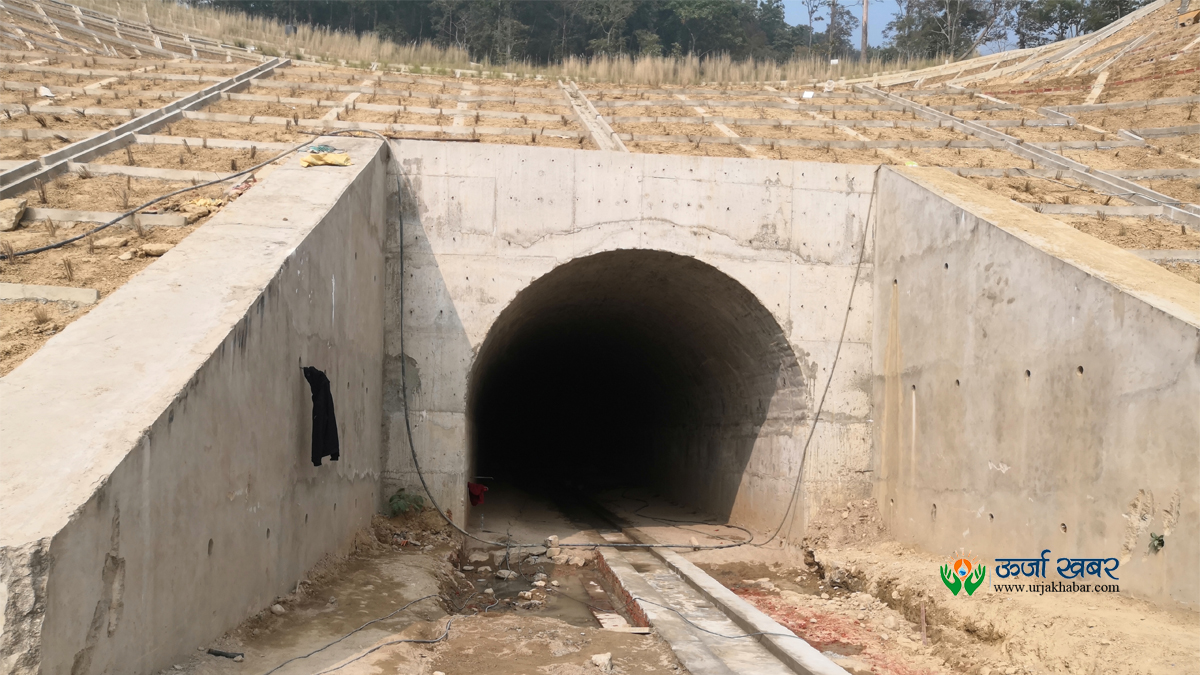
Around 56 percent of the physical works at the Bheri Babai Diversion Multipurpose Project have been completed at Chiple in Bheriganga Municipality, Surkhet. According to Lekhnath Subedi, information officer and chief divisional engineer, the national pride project located in mid-western Nepal has made 41.10 percent financial progress in its first and second phases.
"Despite interruptions caused by Covid-19, bad weather and fast water current in the monsoon, the work goes on," Subedi said. The completion deadline of the scheme, which will divert water from the Bheri to the Babai rivers to irrigate fields and generate electricity, was pushed back by three years after a flood swept away a newly built dam at Chiple on the Bheri River in September last year.

Currently, civil works under the project's second phase are being implemented. “The construction of the headworks, power house and dam is going on,” said Subedi.
The contract for the second package of the project was awarded to Raman Guangdong JV with a completion deadline of August 14, 2023. The Rs6.16 billion contract was signed on July 30, 2020.

“The tender process for the third phase of the project which includes construction and installation of hydro mechanical and electromechanical components is being carried out,” said Subedi.
“While the tender process for the hydro mechanical component has been completed, the procurement process for the electromechanical component has reached its final stage.”
The construction and installation of a gate and penstock pipe under the hydro mechanical component, and the turbine and generator switchyard under the electromechanical component is being carried out, according to Subedi.
A Rs2.13 billion contract was signed with China's Zhejiang Orient Engineering Company to build the hydro mechanical component on November 23 last year. “According to the contract, the work needs to be completed in three years,” Subedi said.
The construction of the project, which is expected to ease the food crisis in the mid-western region by increasing agricultural yield, was inaugurated in April 2015 by the then prime minister Sushil Koirala.
Officially launched in June 2015, the diversion tunnel was completed on April 16, 2019, six months ahead of schedule.
Under the project's inter-basin water transfer scheme, surplus water from the Bheri River will be redirected to the Babai River through a tunnel to irrigate farmlands and generate electricity.
Initially, the pride project was slated to be completed in the upcoming fiscal year beginning mid-July. However, it is estimated that it will take another three years for the scheme to be ready.
Besides providing irrigation facilities to 51,000 hectares of land in Banke and Bardia districts throughout the year, the irrigation-cum-hydropower project is expected to generate 48 megawatts of electricity.
The Bheri Babai Diversion Project is expected to make an indirect financial contribution of Rs3.1 billion to the state through agricultural productivity, and a direct revenue contribution of Rs2.1 billion through energy sales.
The construction of the 132 kV Kohalpur-Surkhet transmission line has moved forward after the federal government on June 20 decided to allow the power line to pass through national forest areas. Currently, work related to land acquisition and construction of substations is going on.
According to project officials, land acquisition work has been completed at Bheriganga Municipality and Birendranagar Municipality in Surkhet and Kohalpur in Banke.
"Land acquisition in some areas of Banke will take time because of related disputes," said Ravi Kumar Chaudhary, head of the transmission line project.
“There are some disputes in Banke’s Baijanath Rural Municipality wards 1 and 4. Even then, we have published the tender call notice for the construction of substations at Kohalpur and Surkhet.”
The transmission line is expected to improve the power supply in Karnali. A total of 13,056 trees will be felled to construct the power line.
"More than 13,000 trees need to be cut down for the construction of the transmission line—6,820 in Surkhet, 3,320 in Bardia and 2,916 in Banke," said Chaudhary.
The trees which fall inside the project area in Birendranagar, Bheriganga and Lekbesi municipalities, Bardia National Park, Kohalpur Municipality and Baijnath Rural Municipality will be chopped down.
"The Nepal Electricity Authority and the Department of Forest will reach an agreement regarding the felling of trees," Chaudhary said.
“The trees inside the national park will be felled by the national park authority, those in the national forest area will be felled by the respective district forest offices, and those in the community forest will be cut down by the respective community forest,” he said. "The entire process will take at least three to four months."
Of the 160 poles that need to be erected for the construction of the transmission line, 130 would be on public land and national park area, and the other 30 would be on private lands, according to the construction company.
While the towers will be constructed on 99 hectares of land, the substations will be constructed at different places. According to the Environmental Impact Assessment report, the transmission line project will occupy 70 hectares of forest area. The foundation work for the 40 towers in undisputed areas have already been completed, according to Chaudhary.
Currently, a 33 kV transmission line is in operation in Karnali province including Surkhet. The Nepal Electricity Authority had planned to upgrade the transmission line in Surkhet to 132 kV more than three decades ago. It is expected to be completed in two years.